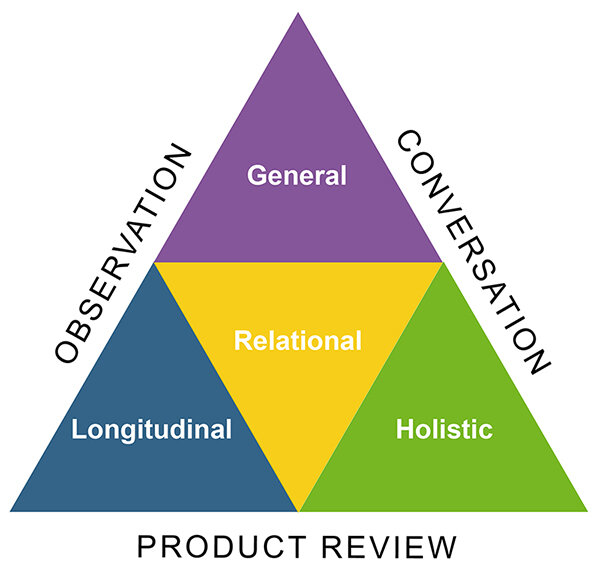August 28, 2023
by Greg Henson, CEO Kairos University; President of Sioux Falls Seminary
Assessment is an important part of education. Many of us are familiar with how assessment is used to determine when someone has completed a certain step in their learning journey (i.e., assessment of learning). It also helps us discern where someone is on their journey of theological education (i.e., assessment for learning). Most important, perhaps, is the fact that it is a powerful tool for helping people move to deeper levels of learning (i.e., assessment as learning).
We think that assessment as learning is extremely important in Kairos. It sets the stage for a robust journey toward Spirit-led excellence. As we participate in this work, we engage in three practices: Observation, Conversation, and Product Review. Each of those is animated by a set of what we call characteristics of assessment. These characteristics provide windows into how the practices can be lived out in the context of an educational journey. The characteristics of assessment are: 1) longitudinal, 2) holistic, 3) general, and 4) relational. Let’s take a look at each one.

Longitudinal
Assessment produces the best and most reliable results when it happens over a period of time that aligns with 1) the vocational goals of the student, 2) the pace the student wishes to move, and 3) the credential being pursued by the student. In some cases, this may happen over several years and, in other cases, it may happen over several months. In all cases, it must be done in the context of a community that can observe one’s learning and development over time. It is this point that requires the development, training, and empowerment of mentor teams. With a view into the life of a student from multiple angles, the mentor team can watch students make progress over time as they develop toward proficiency.
Holistic
When assessment practices are holistic, they are integrative or comprehensive and invite students to integrate learning across domains (i.e., learning outcomes) and dimensions of knowing (i.e., content, character, and craft). This type of assessment invites students to demonstrate not only proficiency of content, character, and craft within a particular domain but also provides the ability to integrate each of those dimensions within an outcome and across multiple domains. Lack of character can nullify one’s proficiency of content or the quality of one’s craft. Even students of exceptional character need to gain the necessary skills. It is hard to imagine any competence in craft could be achieved without the requisite grasp of content or practice of character. An effective assessment system must integrate all three.
General
When coupled with longitudinal engagement, generalized assessment not only encourages deeper but also more integrated learning. Task-specific and analytical rubrics have their place, but they are not useful tools for assessing integrated outcomes. Generalized rubrics create space for a diverse learning community. Whereas task-specific and analytical rubrics impose one way of viewing a particular task or concept, generalized rubrics provide space for students and mentor teams to develop the personal, communal, and theological identity required of them in their context. Customized proficiency and contextualized discipleship are not possible without generalized rubrics that guide the assessment of integrated outcomes.
Alasdair MacIntyre’s argument that traditions only grow as they face a crisis is instructive for us in how learning is always about solving problems that arise in the context of community. General assessment practices invite students to identify problems that arise in the context of their communities, to address those problems through a generative action-reflection process, and to assess learning related to that process in the context of a diverse community. Task-specific assessment, on the other hand, forces students to solve a problem that may not even exist in their context, to address that problem using language that meets a particular theology which may also be foreign, and often assumes that assessment of learning does not require a relationship with the student.
Relational
The very nature of the triune God is relational. It should come as no surprise, therefore, that God works in and through relationships. We must do the same. Human beings are designed to be in relationship with God and others. It is in and through these relationships that one is formed into the likeness of Christ, made aware of who God is and what God wants to do through her or him. It is also through these relationships that we are invited to reflect God’s wise stewardship into this world.
In Kairos, the primary relationship is the one students have with their mentor teams. Because mentors are in relationship with a student over a period of years, they develop a well-rounded view of the student and earn the privilege to provide feedback to the student as they develop competency within a given program’s outcomes. The relational fabric that connects mentors and students strengthens positive feedback and opens the door to authentic and deep constructive feedback. If a faculty mentor first builds a relationship with a student, when the time comes to give feedback that might be difficult for a student to hear, the faculty mentor’s voice will be heard through the filter of relational trust rather than through the filter of positional power. In short, mentors can speak the truth because they have earned trust through a relationship and not because they have been given power through a particular role.
Assessment practices that exhibit these characteristics is a lot to ask. The student and mentors, clearly, will need to adopt a submissive spirit, showing a willingness to be assessed to a degree that might not be possible or even appropriate without consent. We engage in ongoing and integrative assessment because we are always attentive to what we are being called into. Spirit-led excellence begins with humility – with knowing that God has something in store for students, mentors, faculty, and the entire community. Integrated assessment is a wonderful tool for helping us in that work.